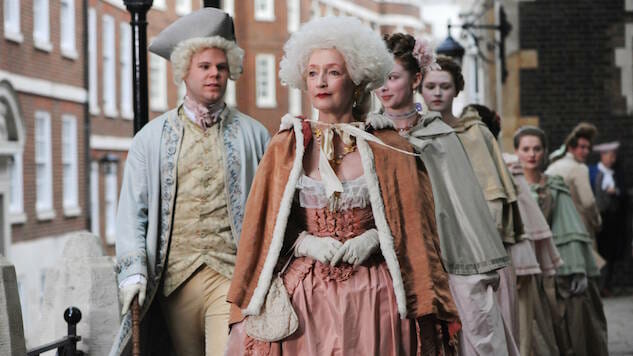Hulu’s Volatile, Illuminating Harlots Is the Anti-50 Shades of Grey
Liam Daniel/Hulu TV Reviews Harlots
Class. Patriarchy. Mobility. Agency. Sex and sexuality. Repression and Puritanism. Madonna-whore complexes. Hypocrisy. Masks and veneers. Family. Ghosts from the past. The neverending battle to stay solvent, stay relevant and stay independent in a ruthless, snakes-and-ladders universe. Hulu’s new drama, Harlots, has it all.
Harlots focuses on a bitter rivalry between two brothel-keepers in Georgian-era London, where, according to the opening scene, one woman in five was a sex worker. Madam Margaret Wells (Samantha Morton) is scrappy and intensely focused on upward mobility, with an “it’s complicated” family of her own as well as her covey of whores: In the first episode, we see her auctioning off the virginity of her youngest daughter, Lucy (Eloise Smyth), as she’s already done with her eldest, Charlotte (Jessica Brown Findlay). She’s completely cold-blooded about it—except she isn’t; it’s actually making her sick to her stomach. Margaret is by turns motherly and steely, conniving and kind, street-smart and… well, maybe not going to be having tea at the palace any time soon. Morton plays her with intensity and vigor and it’s a thoroughly engaging performance.
Across town in Golden Square is Margaret’s nemesis, Lydia Quigley (Lesley Manville), a human glacier whose establishment is less a bawdy-house than a very high-end flesh-boutique. It won’t surprise me if there are multiple turnabouts in our loyalties before this season ends, but a couple of episodes in, Quigley is considerably less charming than the woman who’s selling off her daughters, and I say that advisedly. By all appearances heartless, intensely manipulative and utterly devoid of conscience, this is a woman whose powdered and coiffed veneer hides nothing but greed and malice. The two seem to inhabit different universes and certainly aren’t competing for the same clientele, so it’s almost odd that they’re even aware of one another, much less trying to bring each other down.
Except that Wells’ gin-soused mother just might have sold Wells into harlotry at the ripe age of ten. And the person who purchased her just might have been Lydia Quigley.
Soap opera-worthy machination and intrigue are hardly the whole story here, though. Harlots is a fascinating contemplation of a woman’s world in which there both is and isn’t freedom from the constraints of a society rife with hypocrisy and utterly tyrannized by money. They wield a kind of power—but they don’t. They share a kind of solidarity—but they don’t. They understand their own value—but they don’t. I’m not about to say a man couldn’t have written or directed this show, but I’m glad it was created by women. What might have been voyeuristic is illuminated; what might have been gratuitous—well, it isn’t. It’s brave and truthful writing, deft direction, and voluptuously produced. It manages to convey both the liberation and the desperation of their world; it examines pleasure and exploitation. With sexually explicit film and TV we often speak of “gratuitous” sex or fleshliness or objectification. No such thing here. (For one thing, Georgian clothing is so bloody complicated to get in and out of, you’d need a plot point to justify it!) Seriously, though—in a way I think we might have found a kind of photonegative of (sigh) texts such as, oh, say (sigh) Fifty Shades of Grey. In those films, sex is the ostensible primary subject matter and it is excruciatingly, cringe-inducingly, brain-dead unsexy. There are several reasons for this, and poor screen chemistry, mindless directorial moves and flat-lined source material all share the weight.
Here, in this period drama about whores, guess what? The chemistry’s real, even though these characters are specifically paid to manufacture it. The sex is sexy, even though these women are doing it for money. And the director knows exactly how to give us, not a prurient keyhole to peer through but an open door into the lives of real people in real situations. A lot of stuff is “about sex” for these characters. For viewers, what it’s about it the drama of volatile, messy, triumph-and-tragedy actual human lives.
As it turns out, actual human life can be pretty enticing.
Harlots premieres today on Hulu.
Amy Glynn is a poet, essayist and fiction writer who really likes that you can multi-task by reviewing television and glasses of Cabernet simultaneously. She lives in the San Francisco Bay Area.